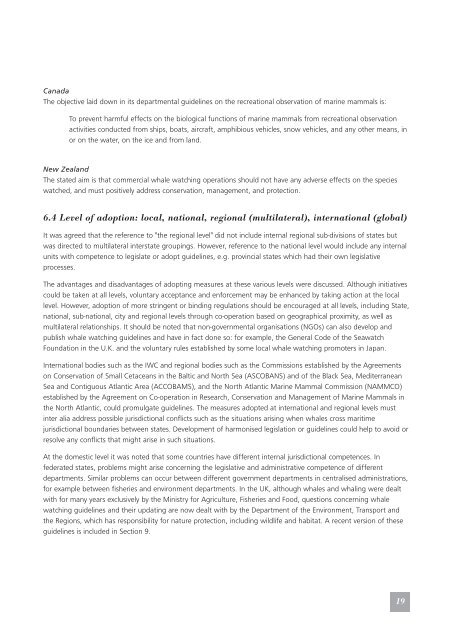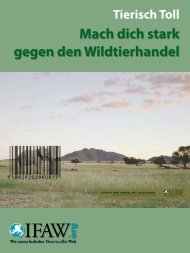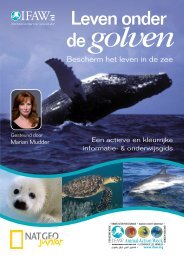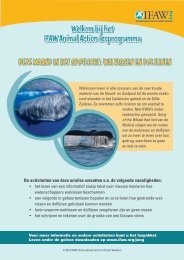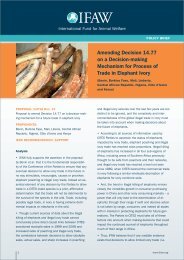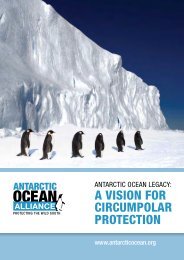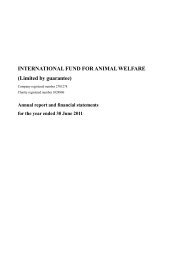leagal aspects of the whale watching.pdf - International Fund for ...
leagal aspects of the whale watching.pdf - International Fund for ...
leagal aspects of the whale watching.pdf - International Fund for ...
Create successful ePaper yourself
Turn your PDF publications into a flip-book with our unique Google optimized e-Paper software.
Canada<br />
The objective laid down in its departmental guidelines on <strong>the</strong> recreational observation <strong>of</strong> marine mammals is:<br />
To prevent harmful effects on <strong>the</strong> biological functions <strong>of</strong> marine mammals from recreational observation<br />
activities conducted from ships, boats, aircraft, amphibious vehicles, snow vehicles, and any o<strong>the</strong>r means, in<br />
or on <strong>the</strong> water, on <strong>the</strong> ice and from land.<br />
New Zealand<br />
The stated aim is that commercial <strong>whale</strong> <strong>watching</strong> operations should not have any adverse effects on <strong>the</strong> species<br />
watched, and must positively address conservation, management, and protection.<br />
6.4 Level <strong>of</strong> adoption: local, national, regional (multilateral), international (global)<br />
It was agreed that <strong>the</strong> reference to "<strong>the</strong> regional level" did not include internal regional sub-divisions <strong>of</strong> states but<br />
was directed to multilateral interstate groupings. However, reference to <strong>the</strong> national level would include any internal<br />
units with competence to legislate or adopt guidelines, e.g. provincial states which had <strong>the</strong>ir own legislative<br />
processes.<br />
The advantages and disadvantages <strong>of</strong> adopting measures at <strong>the</strong>se various levels were discussed. Although initiatives<br />
could be taken at all levels, voluntary acceptance and en<strong>for</strong>cement may be enhanced by taking action at <strong>the</strong> local<br />
level. However, adoption <strong>of</strong> more stringent or binding regulations should be encouraged at all levels, including State,<br />
national, sub-national, city and regional levels through co-operation based on geographical proximity, as well as<br />
multilateral relationships. It should be noted that non-governmental organisations (NGOs) can also develop and<br />
publish <strong>whale</strong> <strong>watching</strong> guidelines and have in fact done so: <strong>for</strong> example, <strong>the</strong> General Code <strong>of</strong> <strong>the</strong> Seawatch<br />
Foundation in <strong>the</strong> U.K. and <strong>the</strong> voluntary rules established by some local <strong>whale</strong> <strong>watching</strong> promoters in Japan.<br />
<strong>International</strong> bodies such as <strong>the</strong> IWC and regional bodies such as <strong>the</strong> Commissions established by <strong>the</strong> Agreements<br />
on Conservation <strong>of</strong> Small Cetaceans in <strong>the</strong> Baltic and North Sea (ASCOBANS) and <strong>of</strong> <strong>the</strong> Black Sea, Mediterranean<br />
Sea and Contiguous Atlantic Area (ACCOBAMS), and <strong>the</strong> North Atlantic Marine Mammal Commission (NAMMCO)<br />
established by <strong>the</strong> Agreement on Co-operation in Research, Conservation and Management <strong>of</strong> Marine Mammals in<br />
<strong>the</strong> North Atlantic, could promulgate guidelines. The measures adopted at international and regional levels must<br />
inter alia address possible jurisdictional conflicts such as <strong>the</strong> situations arising when <strong>whale</strong>s cross maritime<br />
jurisdictional boundaries between states. Development <strong>of</strong> harmonised legislation or guidelines could help to avoid or<br />
resolve any conflicts that might arise in such situations.<br />
At <strong>the</strong> domestic level it was noted that some countries have different internal jurisdictional competences. In<br />
federated states, problems might arise concerning <strong>the</strong> legislative and administrative competence <strong>of</strong> different<br />
departments. Similar problems can occur between different government departments in centralised administrations,<br />
<strong>for</strong> example between fisheries and environment departments. In <strong>the</strong> UK, although <strong>whale</strong>s and whaling were dealt<br />
with <strong>for</strong> many years exclusively by <strong>the</strong> Ministry <strong>for</strong> Agriculture, Fisheries and Food, questions concerning <strong>whale</strong><br />
<strong>watching</strong> guidelines and <strong>the</strong>ir updating are now dealt with by <strong>the</strong> Department <strong>of</strong> <strong>the</strong> Environment, Transport and<br />
<strong>the</strong> Regions, which has responsibility <strong>for</strong> nature protection, including wildlife and habitat. A recent version <strong>of</strong> <strong>the</strong>se<br />
guidelines is included in Section 9.<br />
19


